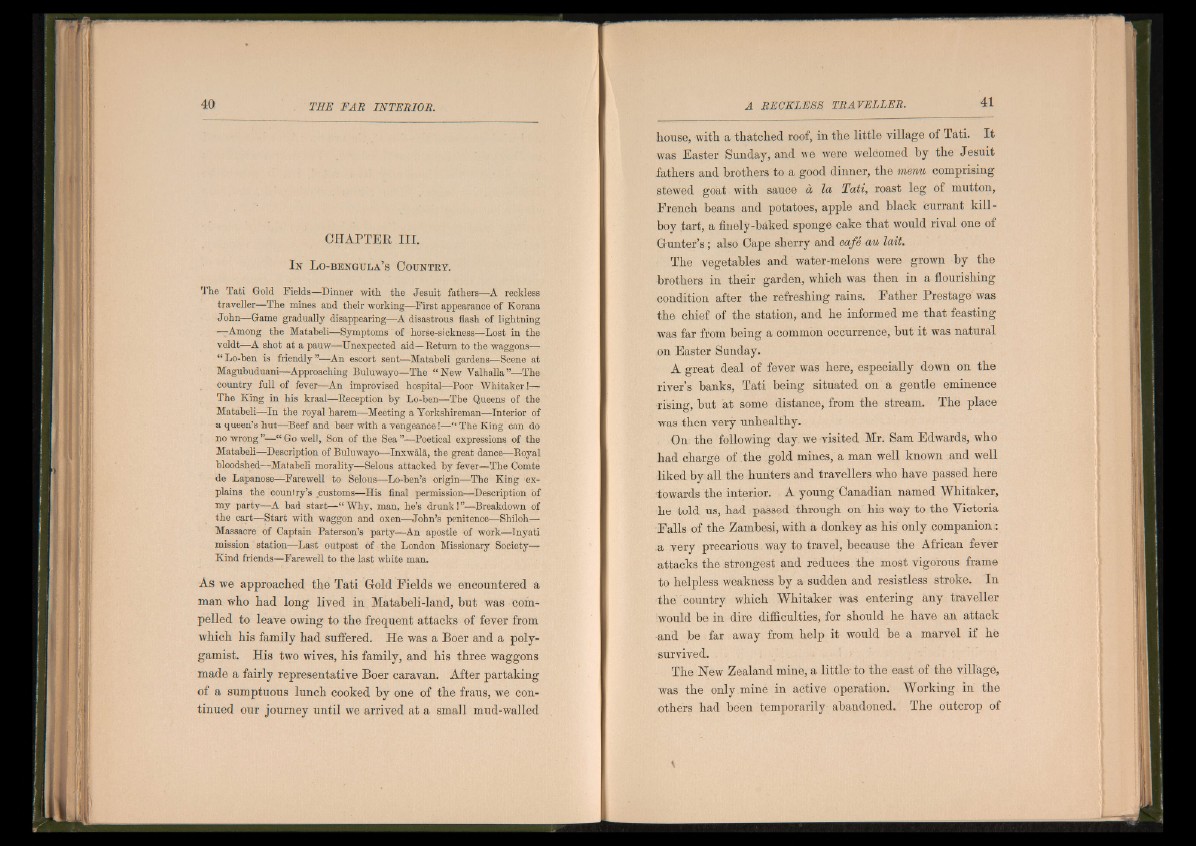
CHAPTER III.
I n L o-b e n g u l a ’s C o u n t r y .
The Tati Gold Fields—Dinner with the Jesuit fathers—A reckless
traveller—The mines and their working—First appearance of Korana
John—Game gradually disappearing—A disastrous flash of lightning
—Among the Matabeli—Symptoms of horse-sickness—Lost in the
veldt—A shot at a pauw—Unexpected aid—Return to the waggons—
“ Lo-ben is friendly —-An escort sent—Matabeli gardens—Scene at
Magubuduani—Approaching Buluwayo—The “ New Valhalla”f||The
country full of fever—An improvised hospital—Poor Whitaker!—
The King in his kraal—Reception by Lo-ben—The Queens of the
Matabeli—In the royal harem—Meeting a Yorkshireman—Interior of
a queen’s hut—Beef and beer with a vengeance!—“ The King can do
no wrong ”—“ Go well, Son of the Sea ”—Poetical expressions of the
Matabeli—Description of Buluwayo—Inxwala, the great dance—Royal
bloodshed—Matabeli morality—Selous attacked by fever—The Comte
de Lapanose—Farewell to Selous—Lo-ben’s origin—The King explains
the country’s customs—His final permission-^Description of
my party—A bad start—“Why, man, he’s drunk!”—Breakdown of
the cart—Start with waggon and oxen—John’s penitence—Shiloh—•
Massacre of Captain Paterson’s party—An apostle of work—Inyati
mission station—Last outpost of the London Missionary Society—
Kind friends—Farewell to the last white man.
As we approached the Tati Gold Fields we encountered a
man who had lung lived in Matabeli-land, but was compelled
to leave owing to the frequent attacks of fever from
which his family had suffered. He was a Boer and a polygamist.
His two wives, his family, and his three waggons
made a fairly representative Boer caravan. After partaking
of a sumptuous lunch cooked by one of the fraus, we continued
our journey until we arrived at a small mud-walled
house, with a thatched roof, in the little village of Tati. I t
was Easter Sunday, and we were welcomed by the Jesuit
fathers and brothers to a good dinner, the menu comprising
stewed goat with sauce a la Tati, roast leg of mutton,
French beans and potatoes, apple and black currant kill-
boy tart, a finely-baked sponge cake that would rival one of
Gunter’s ; also Cape sherry and café au lait.
The vegetables and water-melons were grown by the
brothers in their garden, which was then in a flourishing
condition after the refreshing rains. Father Prestage was
the chief of the station, and he informed me that feasting
was far from being a common occurrence, but it was natural
on Easter Sunday.
A great deal of fever was here, especially down on the
river’s banks, Tati being situated on a gentle eminence
rising, but at some distance, from the stream. The place
was then very unhealthy.
On the following day we visited Mr. Sam Edwards, who
had charge of the gold mines, a man well known and well
liked by all the hunters and travellers who have passed here
•towards the interior. A young Canadian named Whitaker,
he told us, had passed through on his way to the Victoria
Falls of the Zambesi, with á donkey as his only companion:
a very precarious. way to travel, because the African fever
attacks the strongest and reduces the most vigorous frame
to helpless weakness by a sudden and resistless stroke. In
the' country which Whitaker was entering any traveller
would be in dire difficulties, for should he have an attack
-and be far away from help it would be a marvel if he
survived.
The New Zealand mine, a little-to the east of the village,
was the only mine in active operation. Working in the
others had been temporarily abandoned. The outcrop of